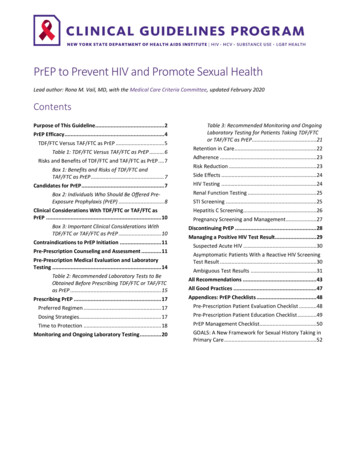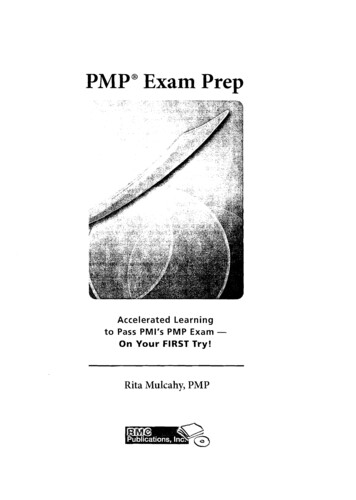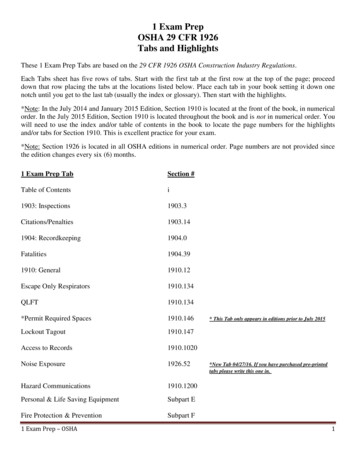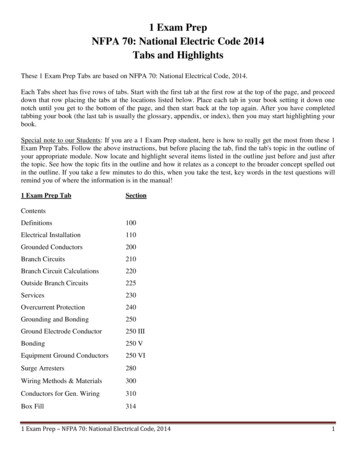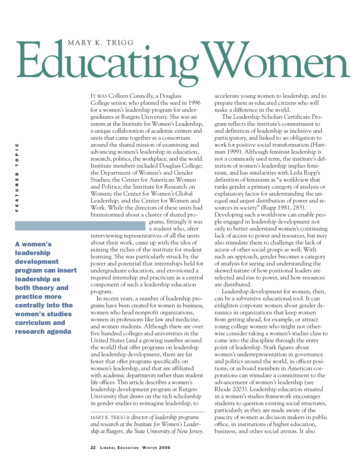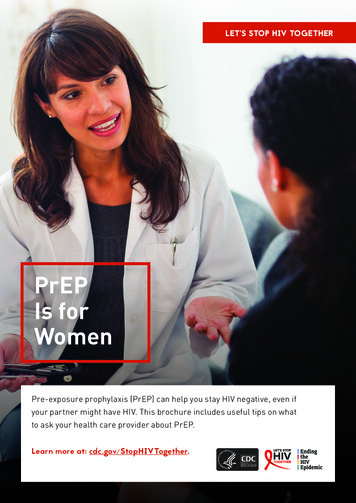
Transcription
LET’S STOP HIV TOGETHERPrEPIs forWomenPre-exposure prophylaxis (PrEP) can help you stay HIV negative, even ifyour partner might have HIV. This brochure includes useful tips on whatto ask your health care provider about PrEP.Learn more at: cdc.gov/StopHIVTogether.
What You Need to Know:1. PrEP (pre-exposure prophylaxis) is highly effective at preventing sexual transmissionof HIV when taken as prescribed. It can also reduce the risk of getting HIV from usinginjection drugs.2. Truvada (or a generic equivalent) is the only PrEP medication approved for use bywomen and other people who have receptive vaginal sex.3. Talk with your health care provider to learn the facts about PrEP and how you canprotect yourself from HIV.1PREP IS FOR WOMEN
PrEP: Prevent HIV Before ExposureWhat Is PrEP?PrEP is a safe and effective medicine that can protect you from HIV if youare at risk for getting the virus from sex or injection drug use.PrEP is a medication that is taken by mouth as prescribed by yourhealth care provider. An advantage to PrEP is that it’s an HIV preventionmethod that women and other people who have receptive vaginal sex canindependently control. In fact, PrEP can help empower anyone to takecontrol of protecting themselves from HIV.There are different medications approved for use as PrEP, but Truvada (or a generic equivalent) is the only PrEP medication approved for use bywomen and other people who have receptive vaginal sex (such as sometransgender men or people of non-binary gender).INFORMATION FOR PATIENTS2
How Effective Is PrEP?PrEP is highly effective for preventing HIV. It greatly reduces the risk ofgetting HIV from sex when taken as prescribed. Although there is less information about how effective PrEP is amongpeople who inject drugs, we do know that PrEP lowers the risk of gettingHIV when taken as prescribed. PrEP is much less effective when it is not taken as prescribed.3PREP IS FOR WOMEN
Is PrEP Right for Me?PrEP may be right for you if you test negative for HIV and if any of thefollowing apply to you:If you have had anal orvaginal sex in thepast 6 monthsand you have a sexual partner with HIV(especially if the partner has anunknown or detectable viral load),have not consistently used a condom,orhave been diagnosed with a sexuallytransmitted disease (STD) in the past6 months.inject drugshave an injection partner with HIV, orshare needles, syringes, or otherequipment to inject drugs (forexample, cookers).have beenprescribed PEP(post-exposureprophylaxis)report continued risk behavior, or haveused multiple courses of PEP.If you have a partner with HIV and are considering getting pregnant, talkto your health care provider about PrEP if you are not already taking it.PrEP may be an option to help protect you and your baby from getting HIVwhile you try to get pregnant, during pregnancy, or while breastfeeding.INFORMATION FOR PATIENTS4
How Can I Start PrEP?Talk to your health care provider if you think PrEP may be right for you.PrEP can be prescribed only by a health care provider. Before beginning PrEP, you must take an HIV test to make sure you don’thave HIV. While taking PrEP, you’ll have to visit your health care provider every3 months for:————Follow-up visits.HIV tests.Pregnancy tests if you can become pregnant.Prescription refills.Is PrEP Safe? PrEP is safe, but some people experience side effects, like diarrhea,nausea, headache, fatigue, and stomach pain. These side effects usuallygo away over time. Tell your health care provider about any side effects that are severe ordo not go away.Will PrEP Interfere With My Hormone Therapy?There are no known drug conflicts between PrEP and hormone therapy, and there is noreason why the drugs cannot be taken at the same time.5PREP IS FOR WOMEN
What if I Need to Stop Taking PrEP?There are several reasons why people stop taking PrEP: Your risk of getting HIV becomes low because of changes in your life. You don’t want to take a pill as prescribed or often forget to take yourpills. You have side effects from the medicine that are interfering with yourlife. Blood tests show that your body is reacting to PrEP in unsafe ways.Talk to your health care provider about other HIV prevention methodsthat may work better for you. To learn more, visit: cdc.gov/hiv/basics/prevention.html.If I Stopped Taking PrEP, How Do I Start Taking It Again?Tell your health care provider that you would like to start taking PrEPagain. You will need to take an HIV test before you start PrEP to make sureyou don’t have HIV.INFORMATION FOR PATIENTS6
Why Do I Need to Take PrEP as Prescribed? You must take PrEP as prescribed for it to work. If you do not take PrEP as prescribed, there may not be enough medicinein your bloodstream to block the virus. The right amount of medicine in your bloodstream can stop HIV fromtaking hold and spreading in your body.What Strategies Can Help Me Take PrEP Regularly? Match your medicine schedule to your life: add taking your medicinesto things you already do each day, like brushing your teeth or eating ameal. Try a pill tray with compartments for each day of the week so you cansee whether or not you took your pills that day. Download a free app for your phone that can help remind you when it’stime to take your medicine or attend your medical appointments.7PREP IS FOR WOMEN
Can I Take PrEP Just Once, if I Think I Might Have RecentlyBeen Exposed to HIV? PrEP is for people who are at ongoing risk for HIV. PrEP is not the right choice for people who may have been exposed toHIV in the last 72 hours. If you may have been exposed to HIV in the last 72 hours, talk to yourhealth care provider, an emergency room doctor, or an urgent careprovider about PEP. To learn more, visit: cdc.gov/hiv/basics/pep.html.Can I Stop Using Condoms or Birth Control if I Take PrEP? PrEP provides protection from HIV but does not protect against otherSTDs or prevent pregnancy. Condoms can help prevent other STDs that can be transmitted throughgenital fluids, such as gonorrhea and chlamydia. Condoms are less effective at preventing STDs that can be transmittedthrough sores or cuts on the skin, like human papillomavirus, genitalherpes, and syphilis.INFORMATION FOR PATIENTS8
How Can I Find a PrEP Health Care Provider?Visit the PrEP Locator to find a PrEP provider near you: preplocator.org.How Can I Pay for PrEP?Most insurance plans and state Medicaid programs cover PrEP. There arealso other programs that provide PrEP for free or at a reduced cost: Ready, Set, PrEP makes PrEP medication available at no cost to thosewho qualify, regardless of income. Learn more at: readysetprep.hiv.gov. Co-pay assistance programs help lower the costs of PrEP medications.Income is not a factor in eligibility. Learn more at:gileadadvancingaccess.com or tevahivgenerics.com. A manufacturer’s medication assistance program covers the cost ofPrEP medication with income guidelines. Learn more at:gileadadvancingaccess.com. Some states have PrEP assistance programs. Some cover medication,some cover clinical visits and lab costs, and some cover both. Learnmore at: rams.9PREP IS FOR WOMEN
How Do I Talk to My Health Care Provider About PrEP?During your visit: Give your provider all the details about your life that could be importantto your health. If your sex life is a hard topic to talk about, say that toyour provider. It will help to start the conversation. Tell your provider about your routine, especially things that might makeit easy or hard to take a daily medication. Share your health history. This includes any past illnesses or concernsyou have, as well as a list of your current medications (includingsupplements, herbs, hormones, etc.).After your visit: Call your provider if you have more questions. Schedule tests or follow-up appointments that your provider requested. Be sure to keep your prescription filled and take your medicine asprescribed.CDC’s HIV Risk Reduction Tool shows the HIV risk of various sexual activitieswhen one partner has HIV and the other doesn’t. It also provides tailoredinformation to help understand your risk for getting HIV and how to reduce it.To access the tool, visit: hivrisk.cdc.gov.For more information, call CDC-INFO toll free: 800-CDC-INFO (800-2324636) TTY: (888) 232-6348 or visit: cdc.gov/hiv and search “HIV PrEP”.INFORMATION FOR PATIENTS10
LEARN MORE ATCDC.GOV/STOPHIVTOGETHERSome content reused with permission from the New York City Department of HealthPubNo. 300978March 2021
women and other people who have receptive vaginal sex. 3. Talk with your health care provider to learn the facts about PrEP and how you can protect yourself from HIV. 1 OMEN. PrEP: Pr



